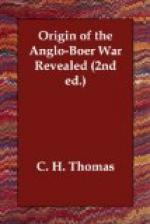We see in that combination the patient, resolute quality prevailing in Holland and the more ardent, vivacious, and chivalrous character found with the French people. The Huguenot refugees belonged undisputably to the cream of that impulsive nation—intellectual, educated, and fearless—whilst both portions were pervaded with deep-rooted religious fervour and habituated to moral and temperate lives.
Those combined qualities and habits would naturally be transmitted to the progeny; prosperity and splendid climatic conditions tended still further to develop a virile physique of first order. The moral and physical standards were maintained by the practice of men and women marrying early in life, and by occupations which required the people to pass most of their time in the open. Educationally, there was unavoidably some retrogression, but there is always plenty of scope in the existence of colonists in a new country for the exercise of a vigorous mind in the study of nature, in overcoming difficulties and in cultivating the faculty of resourcefulness.
Whilst missing the intellectual benefits of advanced civilization, the people escaped the dangers of its vitiating tendencies, thus preserving a healthy mental calibre as well as robust physical health. In addition may be mentioned a very notable fecundal power, which accounts for the phenomenally rapid increase of the people. All those conditions have continued to be maintained with the successive generations up to now.
Those who joined in the exodus north of the Orange River in 1835 and the years following comprised the most indomitable and best endowed of that stalwart race. Twenty years of a nomadic life after that and until they got somewhat settled down served to weed out the weaklings among them; since then their mode of life accorded well to keep up the highest physical standard, not pampered with many comforts, inured to hardships and to out-of-door exercise, with a diet consisting very largely of meat and venison, coupled with energetic exercise of mind and body (the women sharing in the less arduous duties). All this constituted a regimen and training which did not fail to keep the people in a constant condition of high efficiency and equipoise for the performance of tasks and for surmounting difficulties needing more than usual strength, endurance, and fortitude.
The rough labour all over South Africa is done mostly by Kaffirs and other coloured people. A Boer farmer will have from two to ten or more Kaffirs (men and women) employed for out-of-door work and for domestic drudgery. Often absent from home on hunting trips and sometimes on commando, the men entrust their work on such occasions (as is now the case during the present war) to the care of their wives and daughters, assisted by some younger sons, if the family includes any, or else simply with the aid of Kaffir servants. Sometimes they are without any such help, when they take a pride in doing it alone.




